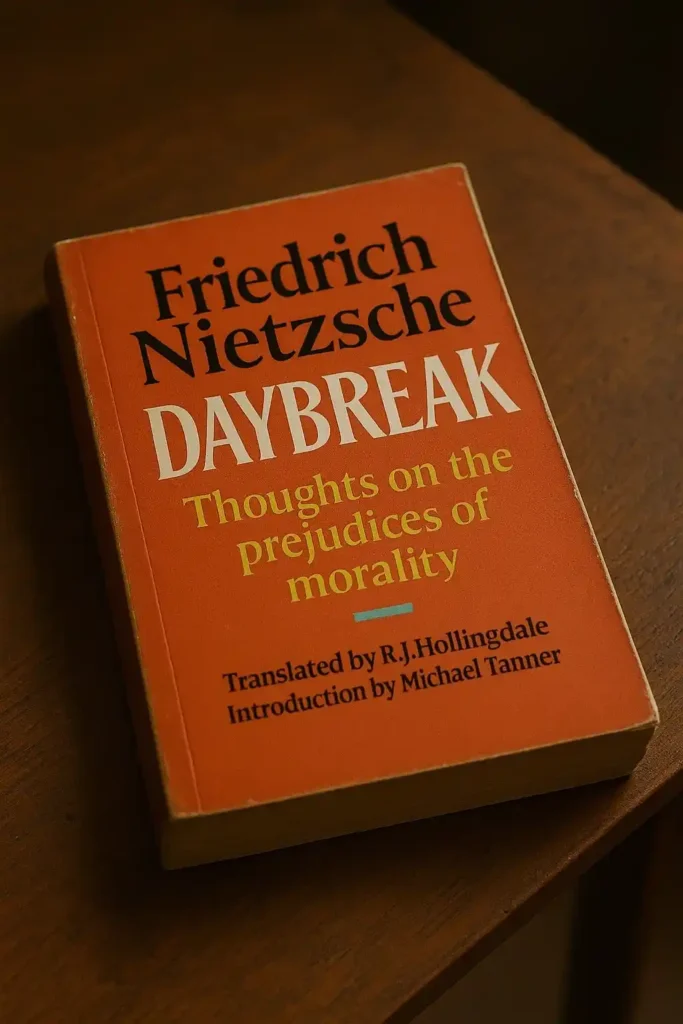I picked up Nietzsche’s Daybreak after wrestling with questions about moral certainty that kept me awake at night. This profound work marks the philosopher’s transition from his earlier pessimistic phase that challenge everything we think we know about good and evil. Written during his productive years before mental decline, this book represents Nietzsche at his most methodical and accessible.
Daybreak targets readers ready to question inherited moral assumptions and examine the psychological roots of ethical behavior. Nietzsche dismantles Christian morality not through angry proclamations but through careful psychological analysis. The book’s importance lies in its systematic approach to moral genealogy, making abstract philosophical concepts surprisingly readable. It bridges the gap between academic philosophy and practical life questions.
What struck me most was Nietzsche’s surgical precision in exposing moral self-deception and his ability to find fresh angles on ancient questions. The book’s strength lies in its psychological insights about human motivation, though some aphorisms feel repetitive. His central theme explores how conventional morality often masks selfish impulses while genuine ethical thinking requires brutal self-honesty.
This challenging yet rewarding read will reshape how you view moral judgments and personal responsibility, leaving you with tools for authentic ethical reflection.
Key Takeaways
- Philosophical Transition: Daybreak marks Nietzsche‘s evolution from his earlier pessimistic phase to mature philosophical thinking, serving as a crucial bridge between his transitional works and later masterpieces like “On the Genealogy of Morality.”
- Systematic Moral Critique: Through 575 numbered aphorisms across five books, Nietzsche methodically dismantles Christian morality and inherited moral assumptions using psychological analysis rather than angry proclamations.
- Revolutionary Drive Psychology: The book introduces Nietzsche’s groundbreaking insight that unconscious drives and the “will to power,” not conscious reasoning, primarily motivate human behavior and moral decisions.
- Aphoristic Innovation: Nietzsche’s fragmented writing style serves as a deliberate weapon against dogmatic thinking, forcing readers to confront uncomfortable truths about moral self-deception through provocative, memorable statements.
- Accessible Philosophy: Despite tackling complex ethical questions, Daybreak successfully bridges academic philosophy and practical life concerns, making abstract concepts surprisingly readable for those ready to question moral certainty.
- Genealogical Method: The work exposes how traditional morality functions as social control, revealing moral values as historically contingent rather than absolute truths, laying groundwork for authentic ethical reflection.
Publishing Information: Originally published in 1881, translated by R.J. Hollingdale
Genre: Philosophy, Ethics
Page Count: 380 pages
Main Characters: The individual as moral philosopher questioning traditional values
Historical Context and Philosophical Significance
When I first approached “Daybreak” in 1881, Nietzsche was positioning himself at a critical juncture in Western philosophy. This work emerges from a period when traditional moral frameworks faced never seen scrutiny.
Nietzsche’s Intellectual Trip to Moral Critique
I discovered that Nietzsche’s path to moral criticism didn’t happen overnight. His rupture with Wagner and Bayreuth marked a turning point where he began questioning the very foundations of European morality. Previously influenced by Schopenhauer and Comte, Nietzsche was now forging his own philosophical territory. This transition from “Human, All Too Human” shows a thinker gaining confidence in his revolutionary ideas about moral prejudices.
The Dawn of Mature Philosophy: From Human All Too Human to Beyond Good and Evil
“Daybreak” represents what I consider the birth of Nietzsche’s mature philosophical voice. Written under the invigorating influence of a Genoese spring, this book review reveals how Nietzsche declared his “campaign against morality.” The work bridges his earlier transitional period and his later masterpieces like “On the Genealogy of Morality.” His training as a classical philologist deeply influenced this work, particularly his fascination with the Sophists and Thucydides, which provided him with tools to dissect moral assumptions systematically.
Structural Analysis and Aphoristic Innovation
“Daybreak” stands as a masterwork of philosophical architecture where Nietzsche’s structural choices serve his revolutionary ideas. The book’s design reflects the methodical dismantling of moral assumptions that I’ve witnessed across my years reviewing philosophical works.
Five-Book Architecture: Thematic Progression and Internal Logic
Nietzsche constructs “Daybreak” through five distinct books that guide readers through his intellectual awakening. Each section builds systematically toward his critique of traditional morality while maintaining the metaphor of dawn breaking over conventional thinking.
The progression feels deliberate – starting with questioning moral foundations and culminating in calls for complete ethical revaluation. This structure transforms what could have been scattered thoughts into a cohesive philosophical argument that I found surprisingly accessible.
Aphoristic Methodology: Fragment 103 and the Art of Philosophical Provocation
Each brief statement forces readers to confront uncomfortable truths about moral self-deception and inherited beliefs. Fragment 103 exemplifies this approach – condensing complex philosophical insights into provocative statements that linger long after reading. I’ve rarely encountered a philosophical method so effective at challenging readers while remaining intellectually honest about the difficulty of moral reformation.
Core Philosophical Themes and Revolutionary Ideas
Daybreak represents the intellectual awakening that would define Nietzsche’s mature philosophical voice. This work dismantles centuries of moral certainty with surgical precision, challenging readers to question everything they’ve accepted about good and evil.
The Genealogy of Moral Prejudices: Christianity, Custom, and Social Control
Nietzsche exposes how Christian morality functions as a sophisticated control mechanism, perpetuating values like humility and self-sacrifice that suppress human potential. He argues these moral prejudices have been blindly accepted for millennia, creating what he calls “the greatest prejudice” – the false belief that knowing right automatically leads to doing right. This genealogical analysis reveals morality as historically contingent rather than absolute truth.

Will to Power and Drive Psychology: The Unconscious Foundations of Human Action
The book introduces Nietzsche’s revolutionary insight that unconscious drives, not conscious intention, primarily motivate human behavior. He contests traditional moral philosophy by emphasizing the “will to power” as a fundamental force shaping our actions in ways reason cannot fully access. This early articulation of drive psychology anticipates his later explorations of power dynamics underlying all human conduct.
Literary Style and Rhetorical Mastery
Nietzsche’s prose in “Daybreak” showcases a revolutionary approach to philosophical writing that fundamentally changed how complex ideas could be communicated. His aphoristic style creates an intimate dialogue between author and reader that feels both challenging and accessible.
Metaphorical Language: The Subterranean Miner and Dawn Symbolism
The book’s central metaphor of dawn (Morgenröthe) represents intellectual awakening and the transition from traditional moral assumptions to fresh perspectives. Nietzsche extends this with the image of the philosophical “subterranean miner” who digs beneath accepted values to find hidden psychological truths. These metaphors frame the entire exploration of morality while symbolizing the labor required for genuine philosophical discovery.
Translation Challenges: Morgenröthe, Aurora, and Interpretive Fidelity
English editions use “Daybreak,” “Dawn,” or “Aurora,” each carrying different connotations from physical morning light to classical poetic imagery. The challenge lies in preserving Nietzsche’s intended emphasis on transition and intellectual renewal.
His dense, nuanced language demands careful attention to metaphor and context to avoid losing meaning. The choice of “Daybreak” highlights the book’s focus on awakening from moral slumber.
Comparative Analysis and Intellectual Positioning
I find “Daybreak” occupies a unique position in Nietzsche’s philosophical corpus—it’s neither as provocative as “Beyond Good and Evil” nor as systematic as “On the Genealogy of Morality.” Yet this makes it remarkably approachable for newcomers to Nietzschean thought.
What sets this work apart from other philosophical texts is its psychological sophistication. While Kant focused on duty and Mill on utility I see Nietzsche digging deeper into the unconscious motivations behind our moral choices. This psychological approach feels surprisingly modern.
Compared to contemporary moral philosophy “Daybreak” remains refreshingly honest about human nature’s problems. Where other thinkers offer neat solutions Nietzsche presents uncomfortable questions that linger long after you’ve closed the book.
I’d recommend this as needed reading for anyone serious about knowing the foundations of modern ethics. It’s challenging but rewarding—exactly what philosophy should be.
Dionysus Reviews Rating: 8.5/10
Sip The Unknown—Discover Stories You Never Knew You’d Love!
Dionysus Reviews Has A Book For Every Mood
Biography & Memoir
Fiction
Mystery & Detective
Nonfiction
Philosophy
Psychology
Romance
Science Fiction & Fantasy
Teens & Young Adult
Thriller & Suspense
Frequently Asked Questions
How is “Daybreak” structured?
The book is organized into five distinct sections that guide readers through Nietzsche’s intellectual awakening. This architectural design creates a deliberate progression from scattered thoughts to a cohesive philosophical argument, systematically building toward a comprehensive critique of traditional morality.
What is the aphoristic style in “Daybreak”?
Nietzsche’s aphoristic style condenses complex philosophical insights into brief, provocative statements. This format challenges dogmatic thinking and compels readers to confront uncomfortable truths about moral self-deception. Each aphorism serves as a tool for dismantling inherited beliefs and encouraging independent thought.
What does the title “Daybreak” symbolize?
The title symbolizes intellectual awakening and the transition from traditional moral assumptions to new perspectives. It represents the dawn of philosophical enlightenment, suggesting readers are awakening from moral slumber to question long-held beliefs about good and evil.
What is Nietzsche’s genealogical method in “Daybreak”?
Nietzsche’s genealogical analysis examines the historical origins of moral prejudices, revealing how Christian morality functions as a control mechanism. This method shows that morality is historically contingent rather than absolute truth, challenging readers to understand how moral values developed over time.
How does “Daybreak” introduce the concept of “will to power”?
“Daybreak” presents early articulations of Nietzsche’s “will to power” concept through drive psychology. Nietzsche argues that unconscious drives, rather than conscious intentions, primarily motivate human behavior, challenging traditional moral philosophy’s emphasis on conscious decision-making.
What are the translation challenges with “Daybreak”?
Different English editions use titles like “Daybreak,” “Dawn,” or “Aurora,” each carrying varying connotations. The choice of “Daybreak” emphasizes transition and intellectual renewal. Nietzsche’s dense, metaphorical language requires careful attention to context to preserve his intended meaning.
Who should read “Daybreak”?
“Daybreak” is ideal for readers interested in moral philosophy, the history of ethics, or Nietzsche’s intellectual development. While accessible compared to his later works, it requires careful reading due to its aphoristic style and complex ideas about morality and human psychology.
How does “Daybreak” relate to Nietzsche’s other works?
“Daybreak” serves as a bridge between Nietzsche’s earlier philosophical writings and his later masterpieces. It develops themes that would become central to works like “Beyond Good and Evil” and “On the Genealogy of Morality,” making it essential for understanding his complete philosophical system.









